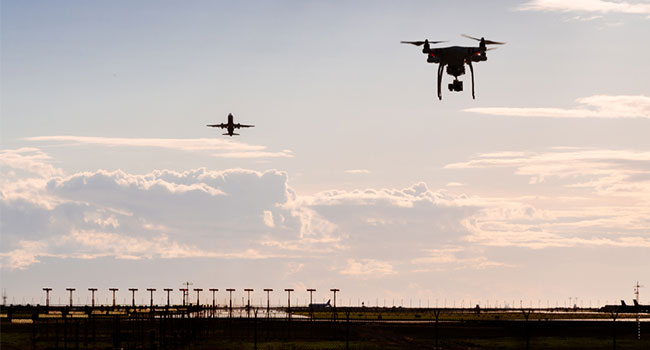
Congressmen Protest TSA Plan to Shoot Down Drones Near Airports
Two House members say the Department of Homeland Security does not have enough authority to deploy defense equipment to take down drones.
- By Haley Samsel
- Nov 26, 2019
Facing a growing number of unauthorized drones flying near airports, the Transportation Security Administration wants to give air marshals the ability to use equipment from the Defense Department to take them down.
But two Republican congressmen are speaking out against the plan, sending a letter to the Department of Homeland Security asking the agency to rethink the idea of empowering non-defense professionals to shoot down small aircraft, which often cause issues for pilots and passengers alike.
Reps. Sam Graves (R-Mo.) and Mike Rogers (R-Ala.), who serve as the top Republicans on the House Transportation and Homeland Security committees respectively, said the DHS plan is not within the scope of powers given to the DHS to counter drones, The Washington Post reported.
“While we share the goal of ensuring that our nation’s airports are not disrupted by negligent or nefarious [unmanned aircraft system] operations, DHS does not have the authority or the experience necessary to operate [counter-unmanned aircraft system] equipment in the manner proposed,” the congressmen wrote in a Nov. 14 letter to DHS Acting Secretary Chad Wolf.
In a statement, the pair said that the only federal agency that understands the complexity of the American flight system is the Federal Aviation Administration, deeming the TSA incapable of taking down drones without disrupting the system.
“Nobody wants drones to cause disruptions at our airports, but to hastily hand over authority to shoot down drones to an agency that doesn’t have the critical knowledge or experience of how our airspace system functions is irresponsible and dangerous,” Graves and Rogers said.
There is little information available about the weapons that the DHS is proposing to use against unmanned aircraft systems, or drones. The Post reported that at the United Nations General Assembly in New York this fall, the Secret Service and Coast Guard tested counter-drone technology. Officials said that the weapons would potentially detect radio signals, locate pilots or disrupt and disable drones.
In their letter to Wolf, Graves and Rogers added that the administration should indicate if another federal agency needs additional authority to address credible drone threats near airports.
“We welcome any discussion along those lines in order to keep our National Airspace System safe and our homeland secure,” they said.
About the Author
Haley Samsel is an Associate Content Editor for the Infrastructure Solutions Group at 1105 Media.